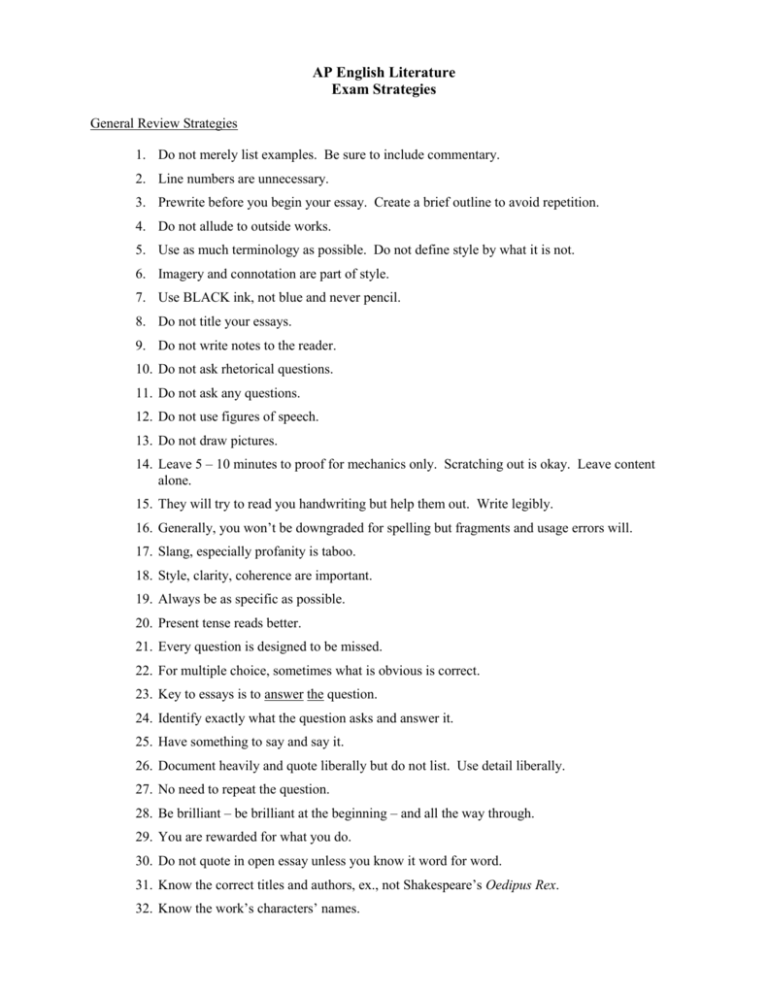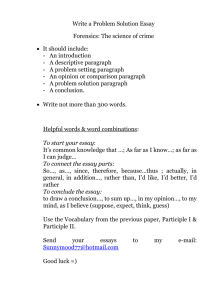Exam Strategies
advertisement

AP English Literature Exam Strategies General Review Strategies 1. Do not merely list examples. Be sure to include commentary. 2. Line numbers are unnecessary. 3. Prewrite before you begin your essay. Create a brief outline to avoid repetition. 4. Do not allude to outside works. 5. Use as much terminology as possible. Do not define style by what it is not. 6. Imagery and connotation are part of style. 7. Use BLACK ink, not blue and never pencil. 8. Do not title your essays. 9. Do not write notes to the reader. 10. Do not ask rhetorical questions. 11. Do not ask any questions. 12. Do not use figures of speech. 13. Do not draw pictures. 14. Leave 5 – 10 minutes to proof for mechanics only. Scratching out is okay. Leave content alone. 15. They will try to read you handwriting but help them out. Write legibly. 16. Generally, you won’t be downgraded for spelling but fragments and usage errors will. 17. Slang, especially profanity is taboo. 18. Style, clarity, coherence are important. 19. Always be as specific as possible. 20. Present tense reads better. 21. Every question is designed to be missed. 22. For multiple choice, sometimes what is obvious is correct. 23. Key to essays is to answer the question. 24. Identify exactly what the question asks and answer it. 25. Have something to say and say it. 26. Document heavily and quote liberally but do not list. Use detail liberally. 27. No need to repeat the question. 28. Be brilliant – be brilliant at the beginning – and all the way through. 29. You are rewarded for what you do. 30. Do not quote in open essay unless you know it word for word. 31. Know the correct titles and authors, ex., not Shakespeare’s Oedipus Rex. 32. Know the work’s characters’ names. 33. Begin with a short introduction of four sentences or less. 34. Do not begin with generalization. Specifically answer the question. 35. Grab the reader’s attention by answering the question right away. 36. Choose key words. Do not repeat word for word. 37. Your essay should be more than one paragraph and usually more than one page. 38. Introduction, two body paragraphs and come to a conclusion, but do not need a concluding paragraph. 39. For the open essay, focus on the work never a video. 40. Choose examples with care and make sure they fit. 41. Do not choose a work that you do not know. Prose Passage Essay Review 1. Familiarize yourself with the types of prose questions (prompts). 2. Highlight the prompt and understand all the required tasks. 3. Time your essay carefully. 4. Spend sufficient time “working the passage” before you begin writing. 5. Mark up the passage. 6. Create a strong opening paragraph. 7. Refer often to the passage. 8. Use concrete details and quotes to support your ideas. 9. Always stay on topic. 10. Avoid plot summary. 11. Include transitions and echo words. 12. Check the models and rubrics for guidance for self-evaluation. 13. Practice – vary the question and your approach. 14. Share ideas with others. Source for the above review suggestions: 5 Steps to a 5: AP English Literature McGraw-Hill 2002 p. 77 The Poetry Essay Review 1. Review poetry elements and techniques. 2. Become familiar with types of poetry questions (prompts). 3. Highlight the prompt to make certain you are aware of required tasks. 4. Time your essay carefully. 5. Read the poem a couple of times. 6. Spend sufficient time “working the poem” before writing. 7. Mark up the poem. 8. Create a strong opening paragraph, including prompt information. [Do not, however, repeat the prompt.] 9. Refer often to the poem for concrete details and quotes to support your ideas. 10. Always stay on topic. 11. Avoid simply paraphrasing. 12. Include transitions and echo words. 13. Practice – vary the prompt and your response. 14. Consult the models and rubrics for self-evaluation. 15. Share ideas with others. Source for the following review suggestions: 5 Steps to a 5: AP English Literature McGraw-Hill 2002 p. 92 The Free-Response [Open] Essay Review 1. Remember the pitfalls of the free-response essay: vagueness and plot summary. 2. Choose AP level full-length novels or plays that you thoroughly recall and understand. 3. Generally use this year’s material. 4. Familiarize yourself with sample free-response prompts. 5. Anticipate free-response prompts. 6. Develop review materials for several full-length works. 7. Practice applying your knowledge to a variety of prompts. 8. Highlight the prompt to make certain you are addressing the requirements of the question. 9. Do not waste time looking at the suggested works. Choose from your own memory bank. 10. Plan the essay thoroughly before you begin writing. 11. Briefly chart your response. Fill in with concrete details and quotes if possible. 12. Write a clear opening paragraph that reflects the question’s requirements. 13. Stay on topic. 14. Avoid plot summary. 15. Include transitions and echo words. 16. Review our models rubrics for self-evaluation. 17. Share your ideas with others. Source for the following review suggestions: 5 Steps to a 5: AP English Literature McGraw-Hill 2002 p. 108 Advice to AP Students on Taking the National Exam: Remarks from Table Leaders 1. The support you give to your statements helps determine the score. 2. It is important to recognize the complexity or the problems within the terms used in the question. 3. Lower-half papers were not consistent and/or did not conclude. 4. Watch “sloganizing” and moralizing! 5. Be aware of mood, tensions that might lie below the surface of the writing. 6. Read the instructions carefully; the scoring scale reflects the components of the question. 7. Know your literary devices. 8. Do not remain abstract, generalized, hazy. 9. Readers are impressed when a writer shows “voice,” i.e., a personalized, real person seems to be behind the essay. Writing competently but flatly will not do. 10. When technique was asked for, or a discussion of concepts contained within a passage, many students just gave plot analyses. 11. The most admirable essays were the ones that worked with language comfortably. 12. The best essays were written by students who controlled the question rather than by those struggling to keep up with the question. Hints from Exam Readers 1. DO . . . write a good thesis paragraph; use interesting (good) vocabulary; use transitions to aid audience; watch poetic form; use the correct terms (In the Eliot passage of 1987, a Church of England gentleman was sent off to mass by one students.); keep margins neat, write with a good black pen, keep handwriting legible and not too small, use White-Out. 2. DON’T . . . confuse lie-lay, simple-simplistic, moral-moralistic, ignorance-innocence; . . . just state an idea; support it. . . . use “utilize” or the phrase “attempts to say” – they are grating! . . . be tentative (no “seems” or “appears”). . . . repeat yourself. . . . use analogous references (This is not a content area exam). . . . repeat the question. . . . use jargon or slang, such as “laid back” or “hassle” (or “buddy up” – see below!) . . . make up words (“conscrew” for “construe”) or use terms you don’t understand. . . . be cute or try to “buddy up” to the reader. (Although known to be human, readers grade objectively by the scoring scale.) . . . be judgmental (“Keats did an effective job here”; “Whitman fails to ….”). . . . cross-reference answers because each question is read by different people. . . . use quotation marks around vague words and hope your audience will understand what you mean. 3. REMEMBER: --Write a complete page! Once you imply or state that you will discuss certain elements in the passage, be sure you do so in the order you promised. --PLOT RECAPITULATION IN ESSAYS SPELLS DISASTER. --Have a positive mental attitude. Think of the questions, not about how YOU are doing. If necessary, promise yourself a time for egocentricism and nervousness AFTER the exam!








